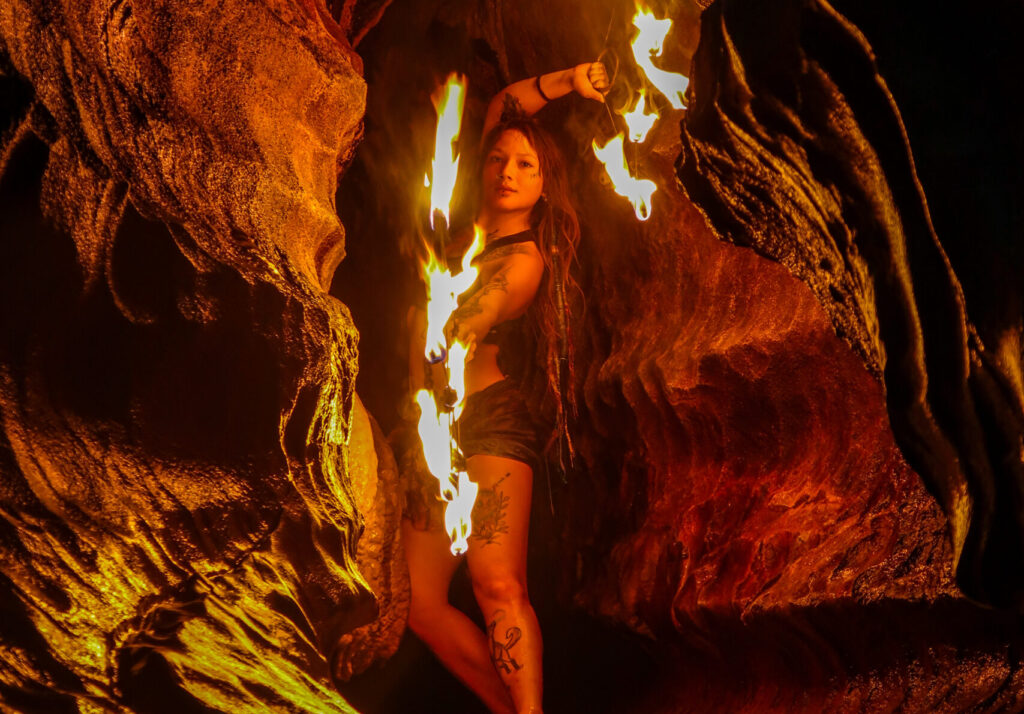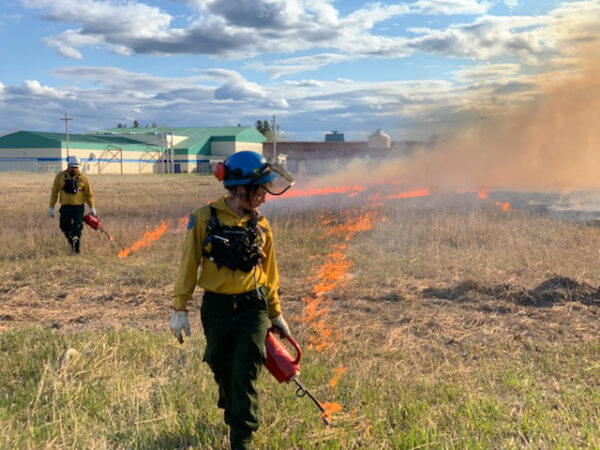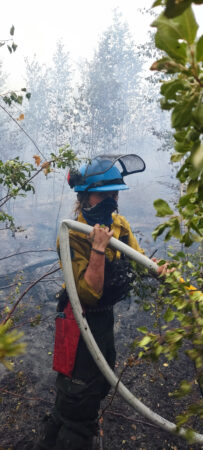
A fiery passion: How an admiration of fire turned into a career battling it
By Kaitlin Secord
Features Wildland canadian firefighter editors pick firefighter training training wildfire wildfire season wildfires Fire is the ultimate educator, it pushes your boundaries but teaches you to stay calm under pressure. Photo credit: Yvonne Meulenbroek
Fire is the ultimate educator, it pushes your boundaries but teaches you to stay calm under pressure. Photo credit: Yvonne Meulenbroek Yvonne Meulenbroek, wildfire crew leader in Norman Wells, N.W.T., has always been intrigued by fire. As a fire spinner in her circus community, her admiration for playing with fire turned into a career battling it.
Meulenbroek grew up travelling around the world; her childhood was spent trying new experiences, in new places, while being homeschooled. “It really helped me to be comfortable with changing quickly all the time. It’s a really important part of who I am and what I do.”
Developing a new passion
Meulenbroek joined the fire service in Norman Wells after a friend recruited her, since the department had found themselves to be short-handed that season. As a lover of the outdoors, hard work and, of course, fire, she jumped at the opportunity and headed straight to the local fitness testing centre.
At the beginning, Meulenbroek saw being a firefighter as an interesting summer job to add to her resume. Her first export changed everything. “It became really clear that the more you learn, the more there is to learn, and it never stopped being interesting for me,” said Meulenbroek. “I’d never touched small engines before getting involved in wildland fire, then suddenly I was using chainsaws and pumps and quickly switching from maintaining equipment to using equipment. I tend to enjoy things that leave me exhausted at the end of the day, and this does all of that.”
From there, her career and evolution as a wildland firefighter began. Meulenbroek now has six seasons under her belt and is ramping up for her seventh. The 2022 season was a big one, both for fires and for Meulenbroek. She held a double role as fire crew lead and as the fire technician.
“Our fire technician left last season, so we offered Yvonne the position. She’s proven to be a fast and eager learner, so we knew she could handle this different type of role,” said Shawn Maxwell, manager of forests in the Sahtu region in N.W.T.
“The job is nebulous, so certain yet so mysterious. You never know where you’ll be, what you’ll be doing or how long it will last.” – Yvonne Meulenbroek
Meulenbroek recalls being offered the role, at first being surprised but then turning to panicked. “My first reaction was that maybe I didn’t know enough to be successful in this role. But my managers chose to see things in me that I didn’t see in myself,” said Meulenbroek. “They helped teach me all of the things I needed to fill the role the way they were expecting.”
Wildland fire crews don’t typically see many women come into the job, let alone into more senior roles. Meulenbroek chooses to see her presence there as a step in a positive direction. “I don’t focus on things like working harder than my colleagues to pass standard fitness testing requirements or being occasionally mistaken for a camp cook,” said Meulenbroek. “At the end of the day, we’re all firefighters and I think we’re often our own worst enemy and just believe that we need to do something more or be more to do the same job.”
To Meulenbroek, its more about equity. “Pound for pound strength doesn’t matter as much as everyone bringing everything they are and have to the table for the good of their crew.”
Meulenbroek doesn’t think her experience is typical. With a small base number of employees, she says it’s easy to be a big fish in a little pond.

Photo credit: Yvonne Meulenbroek
Inspire through teaching
In 2021, the Northwest Territories’ Department of Environment and Natural Resources held an emergency firefighter training camp to help increase the number of women and non-binary people on fire crews.
“It’s not that there isn’t already room in the industry, but there needs to be a shift in perspective. I think women are taking themselves out of the game by thinking, ‘maybe I’m not strong enough, or maybe I’m not good enough’,” said Meulenbroek.
Maxwell said, “Yvonne is a great face for our department. She is quite involved with our female fire fighting camp. She facilitates training of fire behaviours and suppression as well as acts as a mentor for the women attending the camp.”
Meulenbroek eagerly took on the role as an instructor, saying, “It really appealed to me as a pet project because it felt lasting and something I was really invested in.”
Meulenbroek said she struggled to see fire fighting as a long-time career because its so seasonal. With Northern summers being so short, she wasn’t even sure she could make a lifestyle out of it. So, when the chance to do some teaching came up, especially on something she was passionate about, she began to see that, even though fighting fires ebbed and flowed, the chance to educate others and learn was always available.
“It’s inspiring to inspire people,” said Meulenbroek. “It helps to remind me why I got into this job, because it’s so much more than just a spot on a resume to me now.”
Fire is the ultimate educator; it pushes your boundaries but teaches you to stay calm under pressure. It forces you to become confident in what you’re doing and who you are in ways nothing else can, said Meulenbroek.
One of Meulenbroek’s favourite parts of the job is the wisdom-sharing. Seeing a rookie pick something up that she taught them, or getting to learn from a new tool or technique makes every day even more exciting for her.
Before starting her career, Meulenbroek would have described herself as an introvert. “What really brought me out of my shell was getting to relate to other people in this job – it is such a cool thing. Whether it’s people that you work with directly on the crew, in a camp environment or with the community, there is so much knowledge to share. It’s our own little community.”
Meulenbroek describes the job as nebulous, so certain yet so mysterious. “You never know where you’ll be, what you’ll be doing or how long it will last.”
For that reason, the crews need to wear many hats – or helmets. “We’re each other’s cheerleaders and support systems. We hold each member accountable and hope they’ll do the same for us,” said Meulenbroek.
Behind the scenes

Photo credit: Yvonne Meulenbroek
Fighting fires in the Northwest Territories changed during the pandemic. Meulenbroek saw more time on the line and got a clearer view on what is really involved behind the scenes. Her four-person crew was localized to the Northwest Territories, when normally, they mobilize where needed, anywhere across Canada. People couldn’t be in camps, so her crew ended up camping on the line, which meant cooking for themselves after 12-hour shifts. “All we were used to thinking about was doing our jobs and everything else happened for us. The pandemic really impacted logistics. We couldn’t freely go where we needed to because of the travel ban.”
Staffing wildland fire crews has been a challenge, said Maxwell.
Meulenbroek says the job is for a niche group of people. She thinks people’s priorities are shifting and it maybe isn’t even the danger of the job that deters them. “To do this job, you have to be okay without a shower and a plan. We work on Mother Nature’s clock.” Which to Meulenbroek, sounds like the perfect job.
Lessons learned
As self-described “pyro,” if something is on fire, Meulenbroek will be nearby. Fighting fires has allowed her to get closer to the flames she is so intrigued by, while also experiencing its harmful effects and preventing them to keep people safe.
With its short-lived summer season, the Northwest Territories was the perfect place for Meulenbroek to test the fires and grow into her career. Her hopes for the future are to continue growing professionally, potentially extending her season within other regions, like Australia.
“Everything about the job feels like it was meant for me,” Meulenbroek said. Her experience is a lesson in following your heart and saying “yes” to new experiences.
Print this page
Advertisement
- Vernon, B.C. won’t offer fire coverage to area of fatal rural blaze
- Massive fire destroys several $2 million houses under construction in Vaughan, Ont.